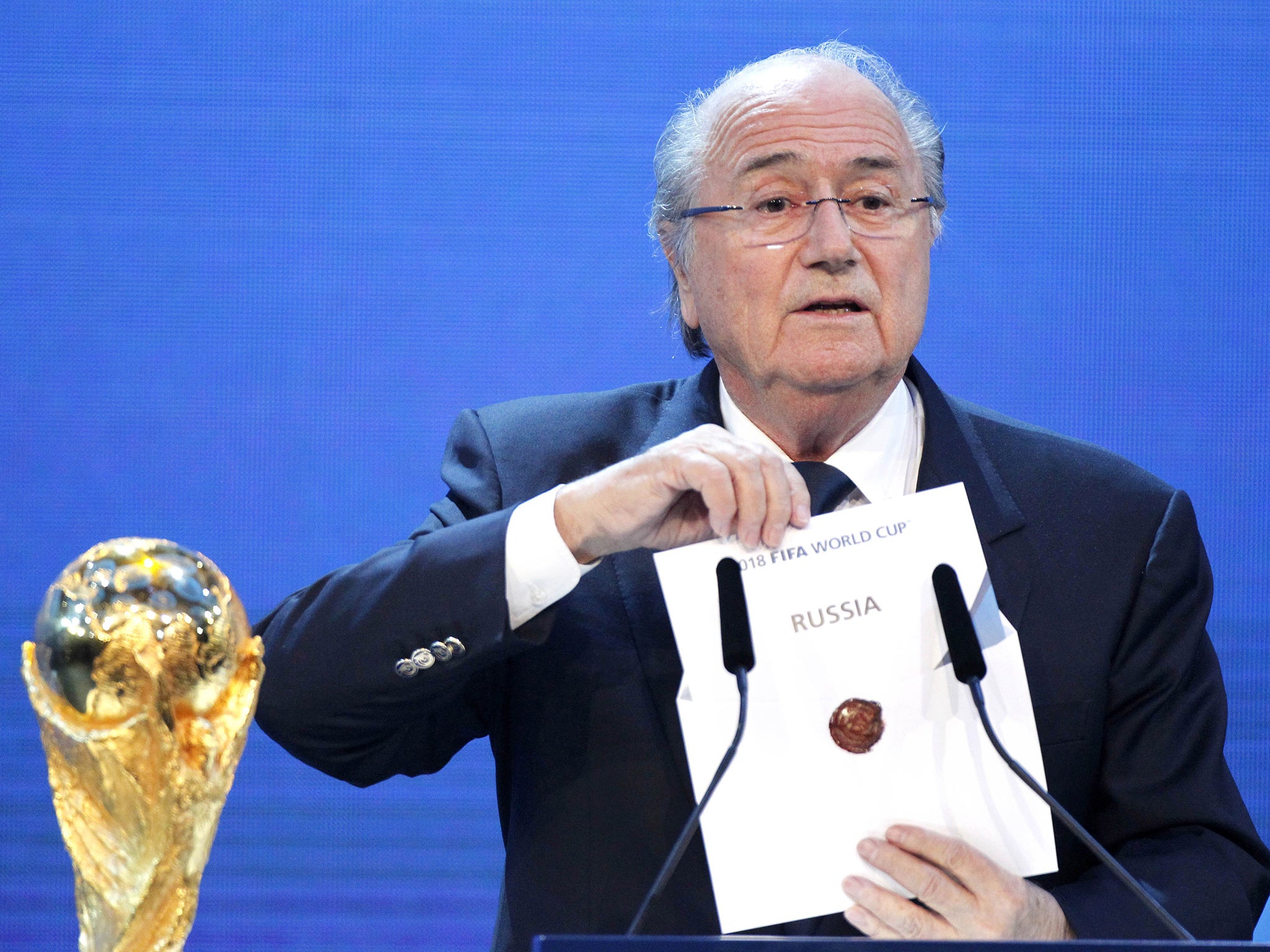Ian Herbert: An England boycott won’t work - but this could still become Fifa's Salt Lake City moment

It sounds like the moment for England to boycott Fifa, don’t you think? World football’s governing body has managed a whitewash so breathtaking in its execution that it even managed to twirl the man hired to investigate it, to borrow a phrase from the lexicon of sportswriting’s dark arts.
Even the rational people seem to abhor Sepp Blatter and his organisation so passionately that they would like to tell him where to stick his Qatar World Cup. They include David Gill, a man who would cross the street to avoid a rabble of journalists when he was Manchester United’s chief executive, but who virtually sought us out in Sao Paulo five months ago to express his disgust at Blatter’s preposterous claim that “racism” had inspired The Sunday Times to expose the alleged bribery which gifted Qatar the 2022 tournament. “It was a responsible [newspaper] investigation. It wasn’t done irresponsibly,” he said. Gill in a mixed zone, praising British journalism. He really must detest Blatter.
Forget all about a boycott, though, because it won’t work. Withdrawing from either the 2018 or 2022 World Cups – tournaments which have been awarded to equally dubious hosts – would cripple the Football Association financially. The FA desperately needs the revenue from qualifying games and World Cup merchandising to help subsidise the grass roots.
A boycott would leave the England manager Roy Hodgson’s bosses desperately seeking more of the friendlies which are becoming an increasing irrelevance, and perhaps finding that young English players with an alternative choice of country would rather turn out for one offering competitive matches.
Key players in the Qatar World Cup bid controversy
Show all 5The FA would also find itself with next to no support for its boycott in the world game. That’s because hardly anyone takes this English indignation seriously. “Bad losers” is how most others view our indignation, since we lost the 2018 bid.
There are wiser means to bring Fifa down. They include diligent investigation and journalistic endeavour, especially if those inside Fifa become increasingly tempted to blow the whistle on their institutionally rank organisation. Marc Hodler, a member of the International Olympic Committee, simply gathered a group of reporters together in the marble lobby of the organisation’s HQ, on a routine December day in 1998, and revealed how voting for the Salt Lake City Games had been corrupted. The scandal changed the IOC for ever.
Michael Garcia could quite conceivably do the same. Blatter was too steeped in complacency to reflect that the investigator would feel a little unhappy about Fifa publishing a corrupted version of his findings, blaming anyone but Fifa for Qatar. When that bomb had been ignited, Fifa then merrily emailed out a press release evangelising about the legacy of the South Africa 2010 World Cup.
Blatter has made himself a dangerous enemy this time: a US attorney, with his credibility on the line, who will not want to be associated with a whitewash and who has ways and means of getting his full report published while not exposing himself to a legal minefield. They include its release through Parliament or select committees.
There will be plenty of journalists ready to follow his clues. The indefatigable Andrew Jennings leads the way. There is an irony in the FA voicing indignation about Qatar now, when it branded Jennings “unpatriotic” and “sensationalist” in 2010, after the BBC’s Panorama chose the eve of the 2018/2022 vote to tackle the same subject.
The FA does not need to expend too much mental energy with protestations. We are closer to the truth than you might think. Qatar 2022 still has the potential to be Fifa’s Salt Lake City moment.
FBI investigation into bidding process continues
The Federal Bureau of Investigation (FBI) is continuing to look into alleged corruption around the bidding processes for the 2018 and 2022 World Cups.
On the day a Fifa report cleared both Russia and Qatar of corruption allegations but heavily criticised the English Football Association for flouting bidding rules in its attempt to stage the 2018 tournament, it emerged that the FBI could uncover far more damning evidence that proves corruption was rife during the process.
Barely four hours after Fifa’s report was released, Michael J Garcia, who carried out the two-year inquiry, said the report “contains numerous materially incomplete and erroneous representations”.
Initially, the FBI investigation which began three years ago, revolved around the United States bid to stage the 2022 World Cup and whether their interests were undermined by the activities of Fifa Executive Committee members. The investigation now appears to have developed beyond just the 2022 bid.
Central to the investigation is Chuck Blazer – a cooperating witness in the investigation alongside Daryan Warner, son of former Fifa vice-president Jack Warner. The elder Warner promised to release damning evidence against Fifa when they expelled him for corruption in 2011 but it has yet to materialise.
Blazer was a leading Fifa official and general secretary of the Confederation of North, Central American and Caribbean Association Football (Concacaf) before outing Warner for corruption in 2011. Having been questioned about tax, he then decided to help the FBI and is understood to have compiled evidence through email correspondence and tape recorded meetings with some of the biggest names in football.
Paul Smith
Subscribe to Independent Premium to bookmark this article
Want to bookmark your favourite articles and stories to read or reference later? Start your Independent Premium subscription today.

Join our commenting forum
Join thought-provoking conversations, follow other Independent readers and see their replies